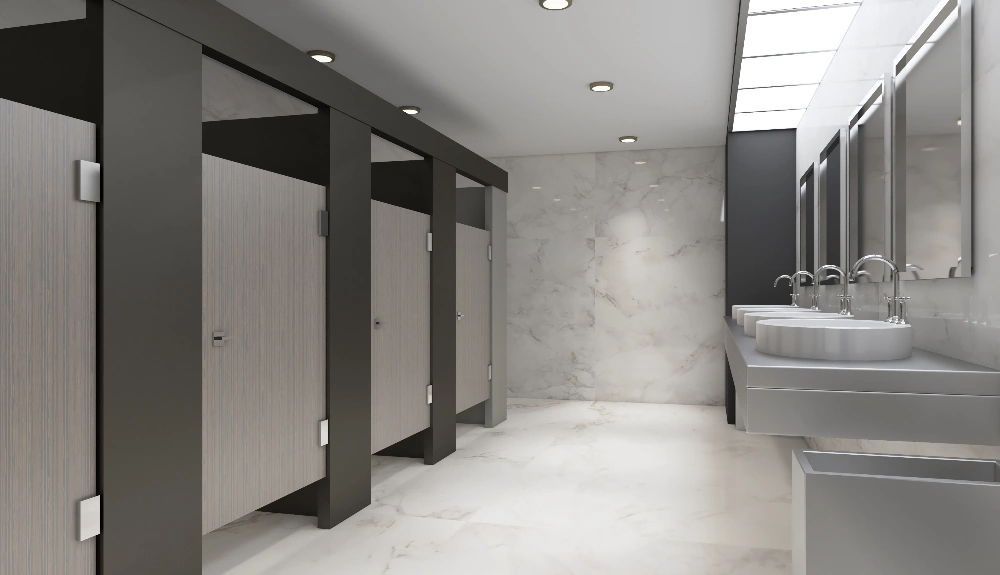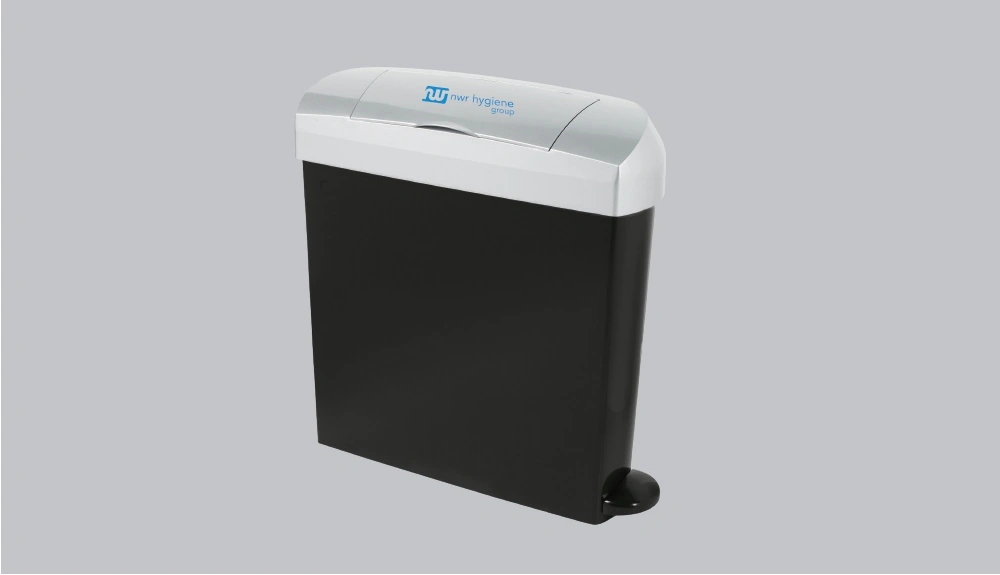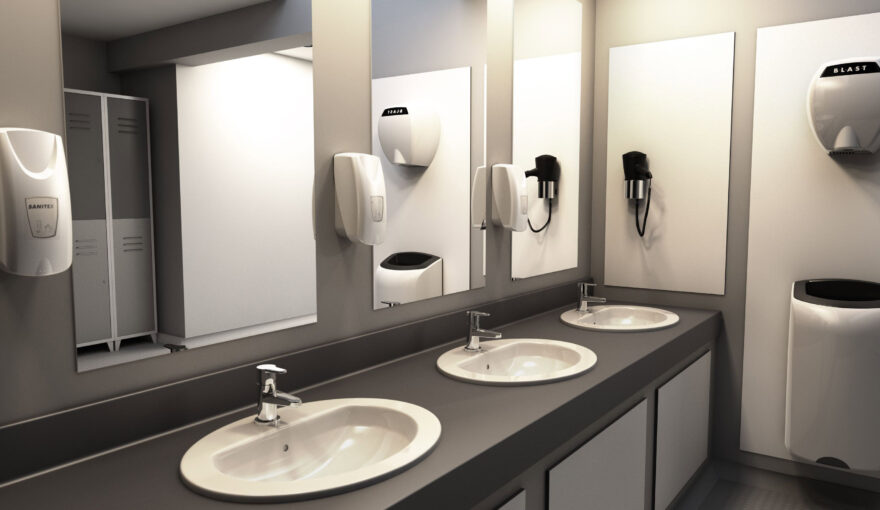Sanitary bins play a vital role in maintaining cleanliness, particularly in public restrooms, workplaces, and shared spaces.

Not only do they contribute to a more pleasant and comfortable environment, but they also help prevent the spread of harmful bacteria, ensuring health and safety for everyone who uses the facility.
In this blog post, we will discuss the health, safety and environmental compliance issues surrounding sanitary bins and disposal, how to select the right bin for your business, and how NWR Hygiene can help.
Health and safety compliance
Proper sanitary bin management is essential for commercial hygiene and health and safety compliance. Businesses are legally required under the Workplace (Health, Safety and Welfare) Regulations 1992 to provide appropriate waste disposal facilities for sanitary products to protect the safety, cleanliness, and dignity of their employees, customers, and visitors.
These regulations require that all female restrooms be equipped with containers specifically designed for sanitary products, which must be emptied and maintained on a regular basis.
Failure to comply with these regulations can lead to significant penalties, reputational damage and unsafe working conditions.
The importance of sanitary bins for meeting health and safety standards
Preventing risks of infections
Sanitary waste can harbour harmful bacteria and pathogens if not properly disposed of, posing significant health risks. Bodily fluids in these products can become breeding grounds for bacteria such as Staphylococcus aureus and Escherichia coli, which can cause infections and illnesses if left to grow in unsanitary conditions.
Without regular maintenance of sanitary bins, bacteria can spread through contact or airborne contamination, putting anyone who uses the facilities at risk of infection. Businesses can reduce the risk of infections and cross-contamination by cleaning and maintaining their sanitary bins on a regular basis.
Maintaining hygiene and cleanliness for employees and visitors
Unsanitary conditions in restrooms can negatively impact the health and well-being of employees and visitors. When restrooms are not properly maintained or don’t have adequate disposal facilities for sanitary waste, it can lead to unpleasant odours and an overall unclean environment, causing discomfort, low morale, and dissatisfaction among those who use them.
Providing sanitary bins in female restrooms also ensures the comfort and dignity of employees and visitors. This is because these bins offer a discreet and convenient disposal option for menstrual products, reducing the embarrassment associated with improper disposal.
Businesses that install sanitary bins in easily accessible locations and maintain them through regular servicing show that they care about the health, safety, and privacy of the individuals who use them, upholding HSE standards and maintaining a positive reputation.
Avoiding legal penalties
Failure to provide and maintain sanitary bins in restrooms can have serious financial consequences for businesses.
Non-compliance with these health and safety regulations may result in fines, legal action, or even the temporary closure of business premises. Additionally, businesses may face negligence claims if their employees or visitors become ill as a result of unsanitary conditions or a lack of proper waste disposal facilities.
Environmental compliance
In the UK, businesses must comply with environmental regulations when managing sanitary waste by providing sanitary bins. This is because, if not managed properly, sanitary waste can have several negative effects on the environment.
Sanitary waste is classified as ‘offensive waste’ under the Environmental Protection Act 1990, which means businesses have a legal obligation to manage it responsibly. This includes ensuring that sanitary waste is handled by a licensed waste carrier who is authorised to collect, transport, and dispose of it in accordance with regulatory requirements.
The Controlled Waste Regulations 2012 require businesses to classify and separate sanitary waste from general waste streams. Additionally, sanitary waste should be collected and treated at licensed facilities to reduce environmental impact,
The importance of sanitary waste disposal environmental standards
Prevents water pollution
When sanitary products such as pads, tampons, or wipes are flushed down the toilet, they can clog pipes and sewer systems. These blockages may cause sewage overflows, which allow untreated wastewater to enter rivers, lakes, or oceans. Such wastewater frequently contains harmful bacteria, viruses, and chemicals from menstrual products, posing serious risks to aquatic life.
By ensuring that sanitary waste is properly collected, treated, and disposed of, the risk of polluting water sources is greatly reduced, contributing to the preservation of clean and safe ecosystems for wildlife.
Reduce landfill waste
Sanitary products like pads, tampons, and wipes often contain nonbiodegradable materials such as plastics, synthetic fibres, and absorbent gels. When discarded in general waste and sent to landfills, these products can last for hundreds of years, contributing to long-term waste accumulation.
The slow decomposition of these materials in landfills can result in the formation of leachate, a liquid that can contain harmful chemicals and contaminants. If not properly managed, leachate can seep into the surrounding soil and groundwater, endangering local ecosystems and drinking water sources.
Sanitary waste can be safely processed and managed by sending it to specialised treatment facilities, reducing the volume of waste sent to landfills.
Lowers greenhouse gas emissions
The correct disposal of sanitary products is critical to reducing greenhouse gas emissions, particularly methane, a potent greenhouse gas that is said to be the second-largest contributor to global warming.
When sanitary waste is disposed of in landfills it undergoes anaerobic decomposition (a process that occurs without oxygen). This type of decomposition produces methane as a byproduct. This has led to landfills becoming one of the largest sources of methane emissions worldwide.
Businesses can significantly reduce methane production by directing sanitary waste to specialised disposal facilities, such as incineration plants. This contributes to a more sustainable waste management system that combats climate change and promotes environmental health.
Choosing the right bin

When selecting the right sanitary bin for your business, consider factors such as size, style, ease of maintenance, and hygiene features.
Below is a breakdown of some of the sanitary bin options available.
Standard sanitary bins
Standard sanitary bins are ideal for offices, restaurants, and small businesses. They are available with either pedal-operated or manual lids and range in size from 10 to 25 litres. They are typically made of durable materials such as plastic or stainless steel.
These bins are easy to maintain, inexpensive, and ideal for medium-traffic areas, making them a reliable and practical option for maintaining hygiene.
Sanipods
SaniPods are ideal for high-end venues or businesses that place a high value on hygiene, such as healthcare facilities and luxury hotels. Their slimline design allows for discreet placement.
With advanced odour control and antimicrobial surfaces, they reduce cross-contamination and fit seamlessly on the walls of modern, upscale interiors, providing a sophisticated and sanitary solution.
Choosing the right provider
Choosing the right sanitary bin provider requires a few key considerations to ensure quality and compliance. This includes:
Range of products
Selecting a sanitary bin provider with a diverse product line ensures that you get solutions that are tailored to different environments and meet the specific needs of your space.
Look for providers who offer multiple options, antimicrobial finishes to reduce bacterial growth, and slimline designs that can fit into tighter spaces, such as small office washrooms or café restrooms.
Odour control and hygiene features
Ensure to look for providers that offer bins with advanced odour control and antibacterial features. This is especially important for businesses in industries such as healthcare, hospitality, and any high-traffic area where hygiene and cleanliness are critical.
Bins with effective odour control mechanisms, such as carbon filters or sealed lids, help prevent unpleasant smells from escaping, creating a more pleasant atmosphere for both employees and customers.
Compliance with UK regulations
When choosing a sanitary bin provider, make certain that they adhere to all UK waste management regulations, ensuring responsible and legal disposal practices. Providers must hold appropriate waste carrier licences and follow specific guidelines for handling sanitary waste, as outlined in the UK’s Duty of Care legislation.
This legislation requires businesses to manage waste in a safe and legal manner from collection to disposal, thereby protecting both public health and the environment.
How NWR Hygiene can help
At NWR Hygiene, we offer a range of sanitary bins, from standard to SaniPods, providing a discreet and hygienic way for washroom users to dispose of sanitary waste.
Each bin in our range has a covered lid to enclose odours, is lined with a scented liner, and has an easy-to-clean surface to prevent a build-up of bacteria.
Our sanitary bins can be used in all washrooms across a variety of sectors, from leisure facilities to healthcare buildings such as hospitals and GP practices, ensuring a pleasant washroom experience for everyone.
Get in touch today for more information on our range of sanitary bins and how we can support your business.

